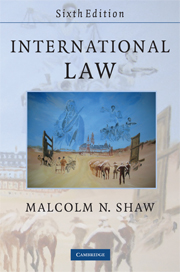Book contents
- Frontmatter
- Contents
- Preface
- Table of cases
- Table of treaties and selected other international instruments
- List of abbreviations
- 1 The nature and development of international law
- 2 International law today
- 3 Sources
- 4 International law and municipal law
- 5 The subjects of international law
- 6 The international protection of human rights
- 7 The regional protection of human rights
- 8 Individual criminal responsibility in international law
- 9 Recognition
- 10 Territory
- 11 The law of the sea
- 12 Jurisdiction
- 13 Immunities from jurisdiction
- 14 State responsibility
- 15 International environmental law
- 16 The law of treaties
- 17 State succession
- 18 The settlement of disputes by peaceful means
- 19 The International Court of Justice
- 20 International law and the use of force by states
- 21 International humanitarian law
- 22 The United Nations
- 23 International institutions
- Some useful international law websites
- Index
16 - The law of treaties
Published online by Cambridge University Press: 05 June 2012
- Frontmatter
- Contents
- Preface
- Table of cases
- Table of treaties and selected other international instruments
- List of abbreviations
- 1 The nature and development of international law
- 2 International law today
- 3 Sources
- 4 International law and municipal law
- 5 The subjects of international law
- 6 The international protection of human rights
- 7 The regional protection of human rights
- 8 Individual criminal responsibility in international law
- 9 Recognition
- 10 Territory
- 11 The law of the sea
- 12 Jurisdiction
- 13 Immunities from jurisdiction
- 14 State responsibility
- 15 International environmental law
- 16 The law of treaties
- 17 State succession
- 18 The settlement of disputes by peaceful means
- 19 The International Court of Justice
- 20 International law and the use of force by states
- 21 International humanitarian law
- 22 The United Nations
- 23 International institutions
- Some useful international law websites
- Index
Summary
Compared with municipal law the various methods by which rights and duties may be created in international law are relatively unsophisticated. Within a state, legal interests may be established by contracts between two or more persons, or by agreements under seal, or under the developed system for transferring property, or indeed by virtue of legislation or judicial decisions. International law is more limited as far as the mechanisms for the creation of new rules are concerned. Custom relies upon a measure of state practice supported by opinio juris and is usually, although not invariably, an evolving and timely process. Treaties, on the other hand, are a more direct and formal method of international law creation.
States transact a vast amount of work by using the device of the treaty, in circumstances which underline the paucity of international law procedures when compared with the many ways in which a person within a state's internal order may set up binding rights and obligations. For instance, wars will be terminated, disputes settled, territory acquired, special interests determined, alliances established and international organisations created, all by means of treaties. No simpler method of reflecting the agreed objectives of states really exists and the international convention has to suffice both for straightforward bilateral agreements and complicated multilateral expressions of opinions. Thus, the concept of the treaty and how it operates becomes of paramount importance to the evolution of international law.
- Type
- Chapter
- Information
- International Law , pp. 902 - 955Publisher: Cambridge University PressPrint publication year: 2008



